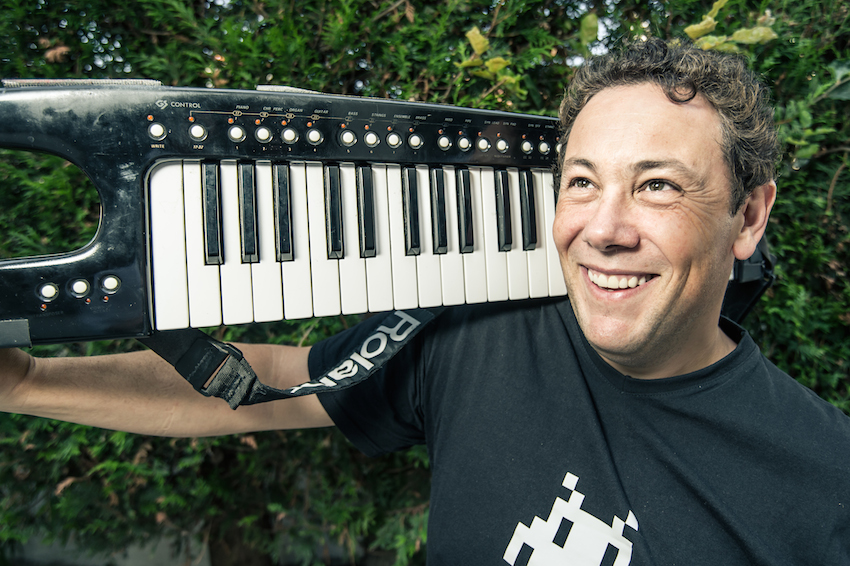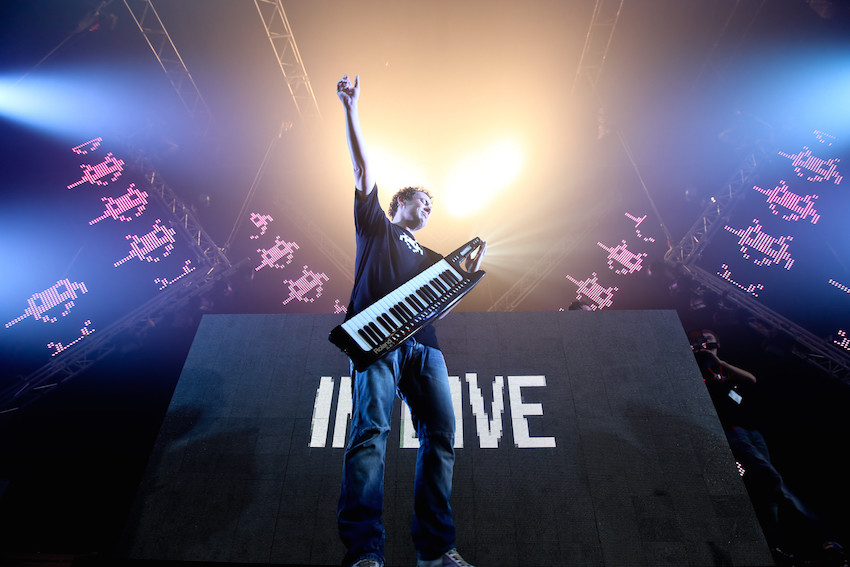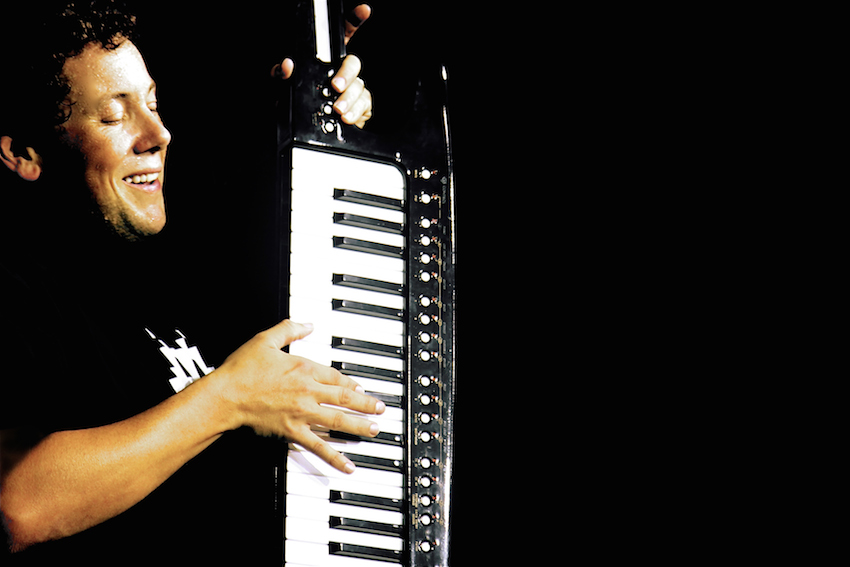A Touch of France with Joachim Garraud
 Thirsty for JUICE content? Quench your cravings on our Instagram, TikTok and WhatsApp
Thirsty for JUICE content? Quench your cravings on our Instagram, TikTok and WhatsApp

The highlight of Martell’s La French Touch party in KL was having veteran French DJ Joachim Garraud as its headliner. Garraud’s portfolio is impressive; he’s worked with the likes of Beyoncé, David Bowie, and David Guetta, played at major festivals like Lolapalooza and Coachella, and he also organises his own EDM festival called Inox Park back in Paris. Having been in the industry for over twenty years, Garraud has seen his fair share of transformations in the music industry — from the death of cassettes and radio to the birth of online streaming, so it was only natural for JUICE to speak to the man about all that he’s seen to see which side of the fence he sits on, and other topics, of course.
Do you think DJs should be fluent in classical music (like you) before pursuing electronic music?
That’s a very cool question. I believe there are only a few DJs who have classical music education, and I was happy to have such an education because I learnt to play musical instruments and was taught how to read music at school. I can’t say that this is the main priority to produce music today because that’s wrong — we’re now in the age of the computer, where a person is able to produce music without having any kind of knowledge regarding music reading or classical music. So, let’s say it’s not necessary, but I was very happy to learn classical music at school, yet also completely agree with people who say that they don’t need to do any classic music schooling to know how to produce music today.
How has having education in classical music benefitted you in the world of dance music though?
When you learn music at school, you’re taught which notes matched with which. Meaning, when you want to produce a song for somebody you can go straight into pinpointing what will give it good harmony, having the right key. It’s a good and comfortable way to produce faster. Music is an international language; you can play rock or drum’n’bass or techno or EDM, but you’re using the same code and this code is the music, so having this language makes it easier to speak faster. So it doesn’t matter if I’m talking to Beyoncé or Perry Farrell who does rock, because we have the same language
Let’s talk about your Kickstarter project for a bit. One of the sets you’re offering is a ‘Producer Box’ which includes the new album, a CME XKEY USB keyboard, and an external hard drive with 1TB memory filled with 25 years’ worth of your work. You’re basically selling your knowledge, and allowing others to fiddle with the stems of your tracks — why? Is this purely to share knowledge or are you planning on retiring soon, so this is a means of keeping your music alive forever and ever since anyone who buys it will have access to it?
(Laughs) That’s a very funny question. I decided to share that knowledge for two main reasons — one, I really love sharing my passion about my music. I was very excited about sharing 25 years of experience with the new generation because it meant that in a few hours, the person going through the hard drive — including the ‘Producer Box’, to check the tutorial and having access to the master station — would be learning a lot. They’re going to learn faster than any school because they have direct access to 25 years’ worth of music production, I [don’t] think anything can replace that experience. So, I was very excited about sharing that knowledge — and because I’m curious to see what the new generation can do by starting with my knowledge. I’m very excited to see if they can bring it to another level, which I’m pretty sure they can.
That’s generous.
It means nothing for me to keep all those secrets to myself. Sharing those secrets will make new secrets and productions, which means new music and styles, so this is the most exciting part of this adventure. The ‘Producer Box’ was really just to share passion, knowledge, and to bring my own experience to a different level — be it different process or different producers. On top of that, one of those people whom has the ‘Producer Box’ can have the same kind of life I have. Let’s say this ‘Producer Box’ can allow somebody to be a professional and to live his life by producing music, and enjoy the kind of life that I have. I think it’s a great point to say that I gave the opportunity to somebody to have a crazy life. It’s definitely not for retirement purposes because I’m currently working three other projects for 2016, so I’m not ready to retire now.
We’re glad to hear that. You started your career way back — like 1989 back, you sat through the end of the CD era, gaining popularity through radio airplay and witnessed piracy at its peak. Streaming is sort of like the legal version of piracy, do you think of this method of “owning” and listening to music as a beneficial one for musicians or would you prefer to go back to the days of owning physical copies of an album?
I can’t really answer that question… when I made the Kickstarter project around the ‘Producer Box’, we designed a beautiful object, a beautiful keyboard and the object was like a trophy. Why I did this is because I’m a little sad that music is virtual and there’s no physical object produced anymore. I completely understand that today you’re renting music, videos, and movies — you’re not owning [anything] anymore and it makes sense, but at the same time, it’s strange to me because it means that for all your life you will have to pay every time you want to listen to a track. But to go back to your question… when I had the idea about the ‘Producer Box’, it was to give the fans an opportunity to have something beautiful in his/her bedroom or studio — something lovely to touch and something they’d want to see every day. 50% of myself is still old school and vintage, I think it’s great to own a physical copy of the album, which is why I’m doing a special collector’s edition for my current album. 96/24 will be available through download or via vinyl. Streaming is cool because you can listen to millions of songs just by having a smartphone in your pocket, and I’m cool with this because now people have less space. They live in small apartments — too small for a hard drive even (laughs). So let’s say my stance is 50/50. Sorry for the long answer, but your question is one of the best questions I’ve been asked in the past few weeks.
Aw, thanks. Speaking of your new album 96/24, what’s the meaning behind the name?
The name of this brand new album is in reference to the highest resolution you can use in a music studio to produce music — 96-kHz and 24-bits. Let’s say this is the complete opposite of an MP3, because MP3 is not really the best quality to listen to music with, so that’s why I called this brand new album 96/24, and it’s available right now.

Ah, significance. That’s cool. So, you’ve been working for 25 years; spearheaded David Guetta’s career in the early ’00s, produced for David Bowie and Moby amongst many other artistes, but your name isn’t as prominent as other EDM DJs — was commercial success not something you prioritised?
I work two different jobs, which means I’m wearing two different hats. The first hat is as a producer. When I’m working with David Guetta, Bob Sinclair, or M83, I’m a producer for them, which means I’m not the artiste. That’s why when I’m behind a project, my name isn’t in big letters but rather it’s in small letters behind the shadow because I’m co-producing. But when I’m using my other hat — the artiste hat — this is when I’m producing a new Joachim album like the brand new one that’s just been released, and it’s important for me to split the two. This brand new album 96/24 is a 100% Joachim Garraud process; I wrote, produced, mastered all the songs so that’s why my name is in big letters here because it’s 100% mine. I think this is why sometimes people don’t know [who I am], or that I’m less famous than other DJs. For example, when we listen to the radio station and the DJ says “[You’re] just listening to the latest track from Avicii” and then you don’t even know who is singing the track. For me it’s a little confusing, because it means that today the producer — which is the guy writing, recording, or mixing the song — his name is bigger than the singer who’s singing the song. And for me that’s a little strange, and that’s why I’m trying to keep these two hats separate.
On top of playing for festivals, you actually organise your own — Inox Park — what made you want to add ‘event organiser’ to your résumé?
I love organising parties and having my friends around me. This year Steve Angelo came to play at Inox Park, I was very happy to see him and say, “Hey Steve, I have my own festival in Paris, this is an outdoor event for 25,000 people, come and I’d like you to be the headliner,” It reminds me of a very cool movie that you can check out on YouTube — it’s called Private Party by Joachim Garraud (laughs). For my birthday in 2005, I had a private party for a hundred people. It was in a small jazz club in Paris and behind the desk were Steve Angelo, Sebastian Ingrosso, Axwell, David Guetta, Bob Sinclair, Joachim Garraud — a lot of friends, and they were there for free. We had an amazing party, so if you watched that video, it’ll give a better understanding as to why producing festivals makes me very happy. I’m always trying to produce a better show and because I have my own festival, it doubles as a laboratory to produce new shows. My first 3D show was in Paris, my first with hologramic effect was also in Paris because it’s a lab.
What’s different about Inox Park in comparison to other EDM festivals around the world?
It’s the better festival. It’s the best one because the spirit is unique. I really love this festival because I’m try managing five different stages that are offering five different styles of music, and I’m very proud to say that I was the first to bring people like Skrillex, Steve Aoki, Avicii in France — their first festival in Paris was at Inox Park, so I’m very proud of that. I’m trying to do a special selection of artistes to maintain the good spirits.
We know you believe that the truth is out there — the truth meaning aliens exist. What would your first question be to an alien if you encountered one? Would you be disappointed if it looked nothing like the creatures portrayed in Steven Spielberg’s movies?
Yes – I’m 100% sure there is life out there. We can’t be alone, if you look at how many galaxies, how big the universe is, it’s impossible to say that we are the only planet with life. It’s mathematically impossible! So yeah, I trust that life is out there. As for their appearance, it’s what humans imagine other lives to be outside Earth. I’m pretty sure aliens don’t have green eyes, I believe it’s more of a form that humans have given them through our own imaginations. But yes, I would be a little disappointed if I were in front of an alien and it looked like a flower or a leaf ‘cos it wouldn’t be sexy but anyway…
Going back to your musical background. Why didn’t you pursue a career in classical music — composing scores or being involved in orchestras — and instead went with electronic music? What was so appealing about being a DJ-producer?
I started classical music education when I was six until I was 16, and when I was a teenager that was not very cool. When I talked to girls or my friends, I was [called] really “old school” and “vintage” by learning classical music. I was really in love with machines after getting my first computer, I thought to myself, “Okay, I love music and I love machines, I want to make music with the machine,” so I started producing music with the computer. Producing music with computer in the late ’80s was limiting ‘cos I could only do ‘cheap sounds’ – sounds for like video games. But I was moving step by step slowly, and very slowly got into electronic music because that was the only music I was able to produce with my computer. Another reason for my decision was that I liked making people dance and you can’t make your 16-year-old friends dance to classical music (laughs). So, I was producing more “dance music” for them to dance to. But I still write classical music sometimes, one of it is ‘Message to the World’ — I used acoustic instruments only — off my new album.
In terms of remixing a song, how do you know which will be suitable for a club/dancefloor? Is there a checklist you go through during production?
It’s very hard to say but say I’m listening to the original song, if I can quickly point and say, “Okay, I love this song, and I’m sure I’m going to be able to do a dancefloor or club version,” then I’ll do it. It’s very hard to go from a song with 82bpm to 130bpm, so there are some rules like this if you already have a good bpm, and if you have… it’s hard to describe but it’s more feeling-[driven], if in one minute I can do a remix, and visualise it to be played on the dancefloor or not, then I’ll do it.
Joachim Garraud played at Martell’s La French Touch party at KL Live on Saturday 16 January ’16.
More from Martell here. Purchase Joachim Garraud’s new album here.


 Get Audio+
Get Audio+ Hot FM
Hot FM Kool 101
Kool 101 Eight FM
Eight FM Fly FM
Fly FM Molek FM
Molek FM